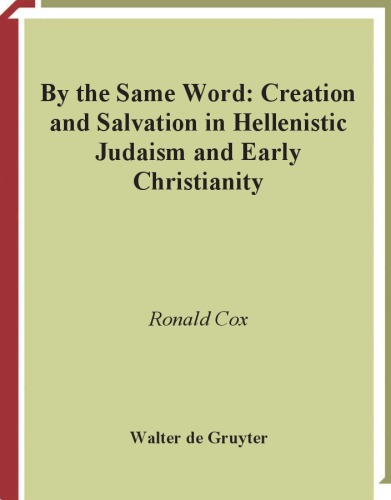

Most ebook files are in PDF format, so you can easily read them using various software such as Foxit Reader or directly on the Google Chrome browser.
Some ebook files are released by publishers in other formats such as .awz, .mobi, .epub, .fb2, etc. You may need to install specific software to read these formats on mobile/PC, such as Calibre.
Please read the tutorial at this link. https://ebooknice.com/page/post?id=faq
We offer FREE conversion to the popular formats you request; however, this may take some time. Therefore, right after payment, please email us, and we will try to provide the service as quickly as possible.
For some exceptional file formats or broken links (if any), please refrain from opening any disputes. Instead, email us first, and we will try to assist within a maximum of 6 hours.
EbookNice Team

Status:
Available4.6
25 reviews
ISBN-10 : 3110193426
ISBN-13 : 9783110193428
Author: Ronald Cox
Middle Platonism explained how a transcendent principle could relate to the material world by positing an intermediary, modeled after the Stoic active cause, that mediated the supreme principle’s influence to the world while preserving its transcendence. Having similar concerns as Middle Platonism, Hellenistic Jewish sapientialism, early Christianity, and Gnosticism appropriated this intermediary doctrine as a means for understanding their relationship to God and to the cosmos. However, these traditions vary in their adaptation of this teaching due to their distinctive understanding of creation and humanity’s place therein. The Jewish writings of Philo of Alexandria and Wisdom of Solomon espouse a holistic ontology, combining a Platonic appreciation for noetic reality with an ultimately positive view of creation and its place in human fulfillment. The early Christians texts of 1 Cor 8:6, Col 1:15-20, Heb 1:2-3, and the prologue of John provide an eschatological twist to this ontology when the intermediary figure finds final expression in Jesus Christ. Contrarily, Poimandres (CH 1) and the Apocryphon of John, both associated with the traditional rubric “Gnosticism”, draw from Platonism to describe how creation is antithetical to human nature and its transcendent source.
Chapter One. Introduction
Chapter Two. Middle Platonic Intermediary Doctrine
Chapter Three. Salvation as the Fulfillment of Creation: The Roles of the Divine Intermediary in Hel
Chapter Four. Salvation as the Reparation of Creation: The Roles of the Divine Intermediary in New T
Chapter Five. Salvation as the Undoing of Creation: The Roles of the Divine Intermediary in “Gnost
Chapter Six. Conclusion
we are the same but different book
word by word the same
the same book
in the same book on a different page
same same book
Tags: the Same Word, Creation, Salvation, Hellenistic, Judaism, Christianity, Ronald Cox